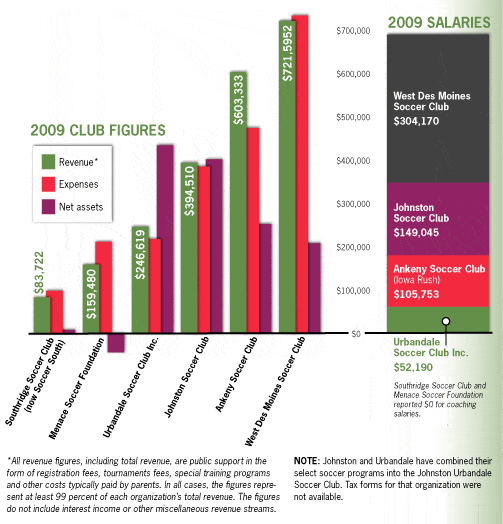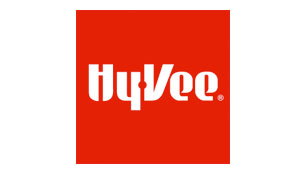Field$ of green

Youth soccer is serious business in Greater Des Moines, but it isn’t supposed to be that way.
It is a business where top clubs pencil in six-figure salary expenses for full-time and contract coaches to instill the finer points of the game in youths ages 4 to 19.
Those clubs recruit the area’s top players for what are called select teams that play matches across the country and, in some cases, have access to foreign players through affiliations with national programs.
“We’re not in the business to make money,” said Corbin Stone, director of coaching for the Ankeny Soccer Club, whose teams have played under the Iowa Rush moniker after an affiliation with a Colorado program that provides administrative support to teams in the United States, Africa and Asia.
But, as Stone will point out, many of the clubs bring in several hundred thousand dollars in revenues every year, as much as many successful small businesses.
These clubs, though, are in the business of teaching young people how to play soccer, not turning a profit.
The clubs do make money, and they spend a lot of money – on coaches, field maintenance, tournament fees, league affiliation costs and other expenses.
For many parents, the costs are incidental to lessons their children learn about soccer, competition and life. But the pay-to-play scenario that shapes soccer instruction in Iowa has triggered the formation of a league in Urbandale that relies on volunteer coaches.
Matt Carver, a former member of the Urbandale Soccer Club board of directors, has found himself at odds with what can only be called the Greater Des Moines soccer establishment, which falls under the supervision of the Greater Des Moines Junior Soccer League and Iowa Soccer Association, both of which refuse to recognize the J-Hawk Soccer Club that Carver and other parents have formed.
Carver has been accused of being a disgruntled parent who left the Urbandale Soccer Club in a huff and went his own way with his own team. And some people in youth soccer say that by creating yet another soccer club, he is diluting the the pool of young talent playing soccer in Greater Des Moines.
For his part, Carver believes that clubs generating six-figure revenues and paying salaries that are approaching the six-figure range should operate as for-profit enterprises. (See sidebar page 28)
But that attitude was far from contagious over the Memorial Day weekend at the Iowa Rush’s home fields in Ankeny, where teams from across the state competed in the Iowa State Cup, a tournament that will conclude this weekend and determine which teams in each age bracket represent the state in Midwest regional tournament play, where they could win a trip to a national tournament sponsored by the U.S. Youth Soccer Association.
Bruce Poitry’s daughter plays for the Johnston Urbandale Soccer Club (JUSC), an organization that was formed by the Urbandale Soccer Club and Johnston Soccer Club to field teams of elite players who are chosen through tryouts or recruited.
Poitry has nothing but praise for the coaches who are paid to coach his daughter and the organizations that provide an outlet for her to play top-level competition. In fact, his daughter, who plays on what is called a U14 team (for youths age 14 or younger), has followed her current coach from soccer clubs in Waukee and Ankeny to JUSC.
He said he pays “about $1,000 for registration, more when we travel to tournaments.” And he doesn’t mind the price.
“The whole thing is a real class organization,” he said.
Dan Seemuth of Clive has followed his daughter to tournaments in St. Louis and Chicago. He was rooting for her Vision Soccer Academy of Waukee team in a semifinal matchup against a team from the West Des Moines Soccer Club at the Iowa State Cup.
Seemuth claimed not to know exactly what it costs to play top-level soccer at Vision Soccer Academy, which is based in Waukee, but said whatever the costs, it’s worth the price.
The sport keeps his daughter active and feeds her competitive spirit.
Seemuth said he coached soccer for a short time, then realized his daughter needed better instruction, the kind that can be provided by trained, sometimes professional coaches.
He was watching the match with Pete McDevitt of Urbandale, whose daughter also plays for Vision Soccer Academy.
McDevitt said the costs were secondary to the “ton of life lessons” the game instilled in his daughter.
“And you learn a lot about what kind of person your daughter is,” Seemuth said. “Things that might surprise you.”
For his part, Corbin said that people outside the youth soccer world have little understanding of the way it operates, or that it even exists.
“Most people don’t even know we’re here,” he said.
Corbin has made it a large part of his life, and he makes no apologies for that fact that it generates decent revenues and provides a platform for professional coaches to make a living.
For the current soccer year, which includes spring and late-summer-into-fall seasons as well as winter training sessions, Corbin’s executive board has approved about $250,000 for full-time and contract coaches.
Corbin said he would have to ask his executive board the exact amount of his salary, but it is lucrative enough to lure him away from the college game.
And regardless of the team, the salaries spread across clubs in Greater Des Moines and Iowa draw coaches from overseas as well as the United States.
For international coaches, they are drawn both by a love of the game – one that they probably learned on empty streets or vacant lots in foreign countries where soccer is engrained in the sports culture – and the chance to earn a decent income.
That introdcution to soccer differs in the United States, where parents, concerned about their lack of knowledge of the game and possessed with a desire to provide nothing but the best for their children, “Americanized” the sport, according to one state soccer official who got his start playing the game in his native England.
Ian Bradley grew up in England and came to the United States in 1993. He has been the director of coaching for the Iowa Soccer Association, the state’s governing body for youth soccer, since 1996.
In that time, he has watched participation grow from 22,000 Iowa children and youths ages 4 to 19, to 42,000.
“There were very few parents who knew the game,” he said. “They tried to find people who did.
“The parents took over and it became the American way.”
In the money
It isn’t cheap to teach kids how to play soccer. Here are examples of Greater Des Moines soccer clubs that operate recreational soccer programs – programs in which all children can play, regardless of skill level and competitive desire – and also field select teams in which players are chosen based on tryouts and, in some cases, recruiting.
Many of these teams travel across the country to play other teams in their age groups. All figures are from Internal Revenue Service Form 990s that are submitted by nonprofit, untaxed organizations. The forms were filed for 2009, the most recent year for which that data was available. The teams are members of the Des Moines Area Select Soccer Association.












